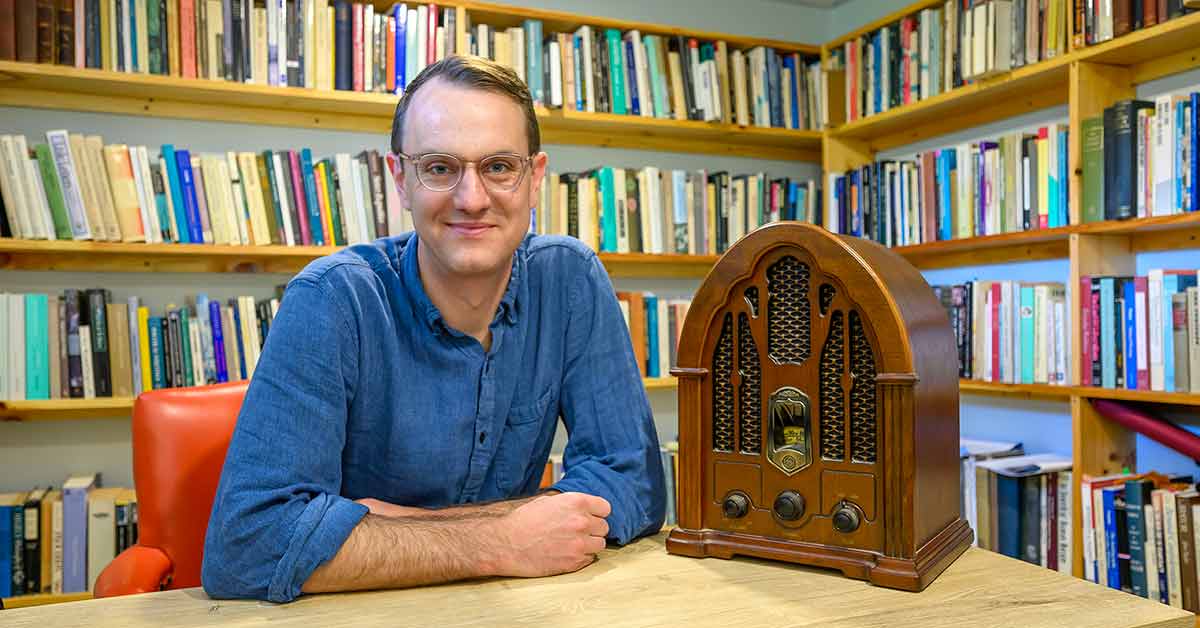Revisiting radio propaganda designed to promote democracy

Wheaton Magazine recently sat down with Professor of the Practice of Political Science Nick Dorzweiler to talk with him about his research into the work of mid-twentieth century political scientist Harold Lasswell. The renowned scholar’s now-forgotten national radio program, “Human Nature in Action,” which was designed to help citizens foster a healthy democracy, holds surprising resonances today.
WM: How did you become interested in this subject?
Dorzweiler: Harold Lasswell was one of the earliest figures attuned to the political significance of pop culture, primarily due to its use in propaganda. His first major book, Propaganda Technique in the World War (1927), studied how nations used culture—newspapers, radio, leaflets, and even gossip networks—for propaganda. Given political scientists’ general lack of attention to popular culture until recent times, there was virtually no scholarship about “Human Nature in Action,” how it fit into Lasswell’s career, or what it might say about his interest in popular culture.
WM: Why would a radio network hire a political scientist for a radio program?
Dorzweiler: When Lasswell and NBC developed this pop psychology program, their goal was to subtly influence listeners to become calmer and reduce their overall anxiety levels. Laswell was concerned that if Americans were too anxious, depressed, or fearful, they wouldn’t be able to engage in democratic processes productively. What he believed was really needed was to get Americans to think more rationally and control their neuroses so that they could engage in politics productively. The idea was to stabilize American social, political, and cultural life to prevent collective anxiety, and political unrest.
WM: Political unrest was a concern at that time?
Dorzweiler: You have to remember the historical context: the Great Depression had been going on for a decade, bringing immense economic hardship and inequality. World War II was on the horizon, with the rise of Nazi Germany, Fascist Italy, and Imperial Japan, creating a sense of democratic backsliding and rising authoritarianism. And there were cultural transformations occurring due to the growth of radio, like the “War of the Worlds” broadcast, which had led many Americans to believe Martians were invading. This was an era of real political, economic, and cultural uncertainty.
WM: What was this radio program like? How long was it, and was it a lecture format?
Dorzweiler: Each episode was 15 minutes long, but the two seasons were quite different. The 1939 season was relatively short, with 12 episodes, and they were mostly straight lecture format. By the second season, NBC invested more money, and there were skits used to dramatize the themes in his lectures. For example, when he discussed what makes a political agitator, there would be dream sequences about childhood memories, with special effects to make actors’ voices sound like they were in a dream.
WM: There was a comfort with propaganda that is interesting and disturbing.
Dorzweiler: Yes, he was not just interested in propaganda, but was a vocal advocate of it. He was looking at Nazi Germany, Imperial Japan, and Fascist Italy—America’s enemies—who were using propaganda, spearheading its use, and he saw how effective it was. So he thought, “If we want to fight back, if we want to protect and preserve American liberal democracy, we need to make propaganda on behalf of democracy.”
But that raises a paradox: what does it mean to create democratic propaganda? Is it democratic to mold citizens’ minds in the way that you think is most rational and democratic through propaganda? For most of us today, or at least for me, that has too many internal contradictions and tensions; I don’t think that’s fully democratic.
WM: How do your students react to this topic?
Dorzweiler: We recently got into a fascinating conversation about how this applies to our own political situation today. How do we confront social media? Do we need government regulation? Do we need influencers, talking about how to control our anxiety on social media? The context of then and now are very different, but there are enough parallels to spark rich discussion.
WM: What lesson do you think there might be in this story for us today?
Dorzweiler.While I think we need to pay a lot more attention to the connections between anxiety and politics, I would advocate approaching that in what I think would be a more democratic way. Lasswell believed the problem was that anxiety was being brought into the public sphere. But I think it would be better to integrate our experiences of anxiety into the public sphere. We need to be able to talk more honestly, openly, and collectively about our experiences of anxiety.
Democracy is the play of multiple ideas and visions for the future, all colliding at the same time. To the extent that a robust democracy is the play of differences, it creates tension, friction, and fear: “What are we going to do? How are we going to do it? Will it work?” These are fundamentally scary questions. To me, you can’t have a fully democratic society and take anxiety out of it. Instead, we need to think about how we honestly and openly confront anxiety in the process of democratic living.
